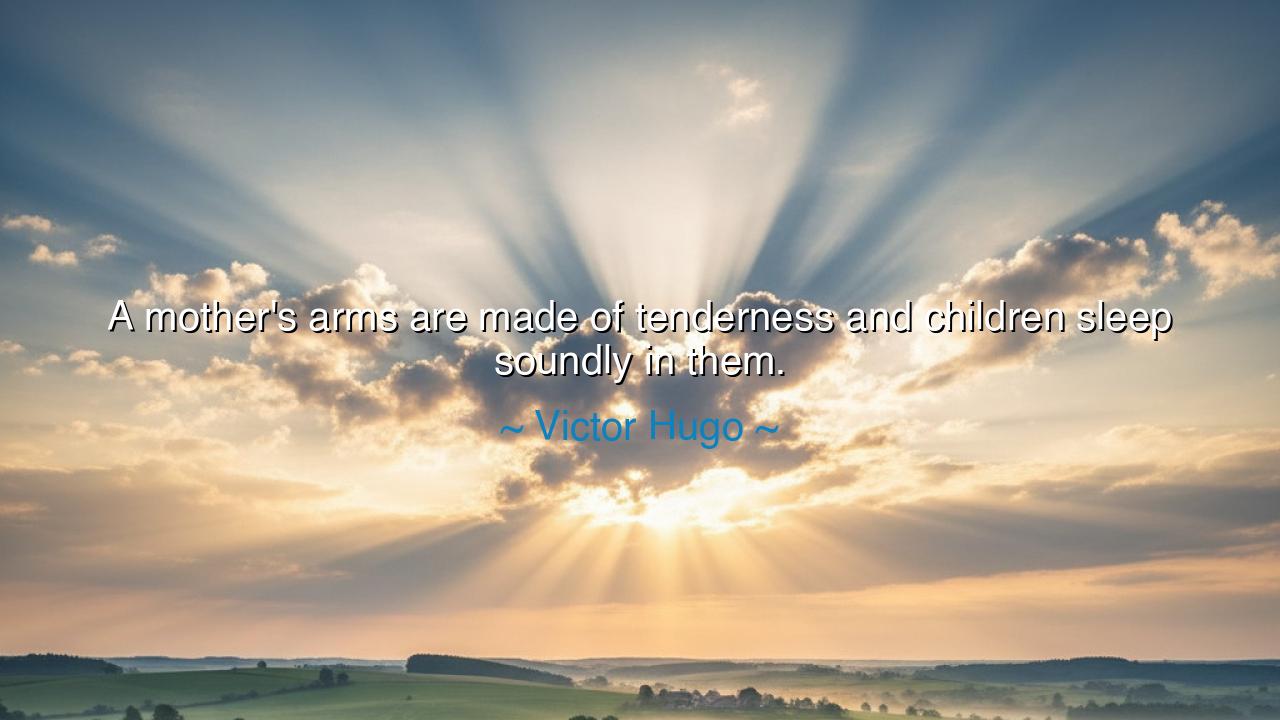
A mother's arms are made of tenderness and children sleep soundly






Hear the words of Victor Hugo, poet of the people and prophet of compassion: “A mother’s arms are made of tenderness and children sleep soundly in them.” In this utterance he does not merely describe a moment of comfort, but unveils a truth eternal—that the embrace of a mother is the first sanctuary of humankind, the fortress of safety where fear is banished and the restless spirit finds peace. The arms of the mother are not only flesh and bone, but symbols of love incarnate, woven with gentleness and strength.
The ancients often spoke of arms as instruments of war, of conquest, of power. Yet Hugo declares the opposite: that the greatest arms are those of the mother, which conquer not by violence but by tenderness. They are the cradle of the infant, the refuge of the weary child, the first and last place where the soul knows it is fully accepted. Within them, the child rests not because the world is without danger, but because in those arms danger is forgotten. Thus the mother’s embrace becomes the holiest of sanctuaries, greater than any palace, mightier than any fortress.
Consider the story of Thetis, mother of Achilles, in the old Greek tales. Though her son was destined for greatness and for doom, she cradled him in her arms with such fierce devotion that even the gods took notice. She dipped him in the waters of the Styx to protect him, holding him by the heel, wishing to guard him forever. Even the strongest warrior of Greece was once a child in his mother’s arms, sleeping soundly in her care. The myth itself reflects Hugo’s truth: before the hero dons his armor, he rests in the tenderness of a mother’s embrace.
History, too, gives us its witness. Abraham Lincoln, whose life was marked by sorrow and burden, spoke often of his mother, Nancy Hanks Lincoln. He said, “All that I am, or hope to be, I owe to my angel mother.” She held him not with riches, but with tenderness, and in those fragile beginnings he found the courage that would one day steady a divided nation. Even the greatest of leaders begin as children who sleep in safety because of the arms that loved them.
The meaning of Hugo’s words grows clear: tenderness is no weakness, but the foundation of life itself. The child who sleeps soundly in a mother’s embrace learns trust, learns peace, learns love. And in time, these lessons shape the adult who can carry compassion into the world. Thus, the mother’s arms are not only comfort for the child—they are the forge of character, the silent school where souls are shaped.
The lesson for us is profound: treasure and honor the power of tenderness. Do not mistake gentleness for fragility, for it is often the gentlest embrace that leaves the deepest mark. To mothers, remember that your arms carry more than your children’s weight—they carry their dreams, their fears, their future. To children, never forget the sanctuary you once knew, and carry that spirit into your dealings with others, offering them safety and comfort as your mother once gave you.
Practical actions are within reach: offer tenderness daily. Hold your children close, not only when they are small but even as they grow, for the soul never outgrows the need for love. To those without children, extend the same spirit to friends, to family, to strangers, through kindness, patience, and warmth. For every act of tenderness is an echo of the mother’s arms, and every echo makes the world more bearable.
Thus let Hugo’s words endure across the ages: “A mother’s arms are made of tenderness and children sleep soundly in them.” They are a reminder that love is the truest refuge, that gentleness is the strongest foundation, and that from the quiet sanctuary of a mother’s embrace the entire human story is born.






AAdministratorAdministrator
Welcome, honored guests. Please leave a comment, we will respond soon